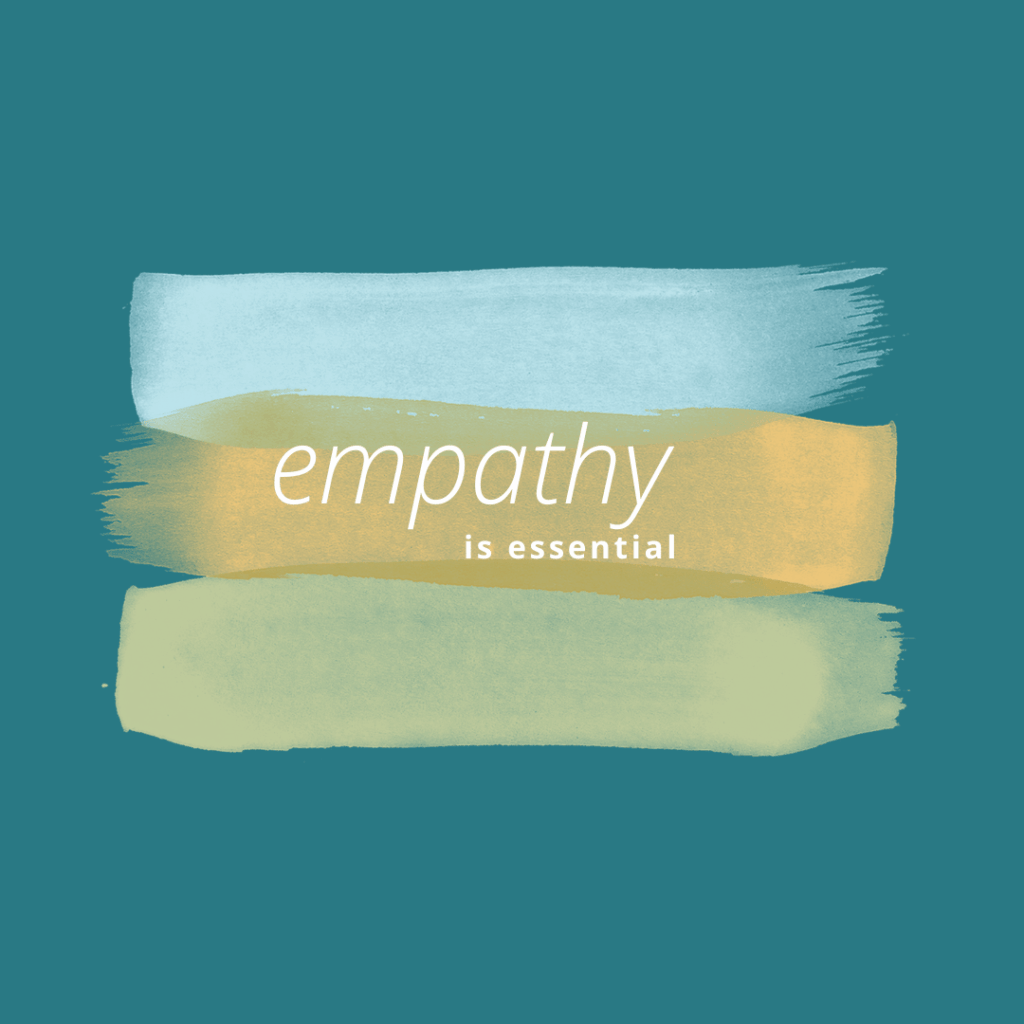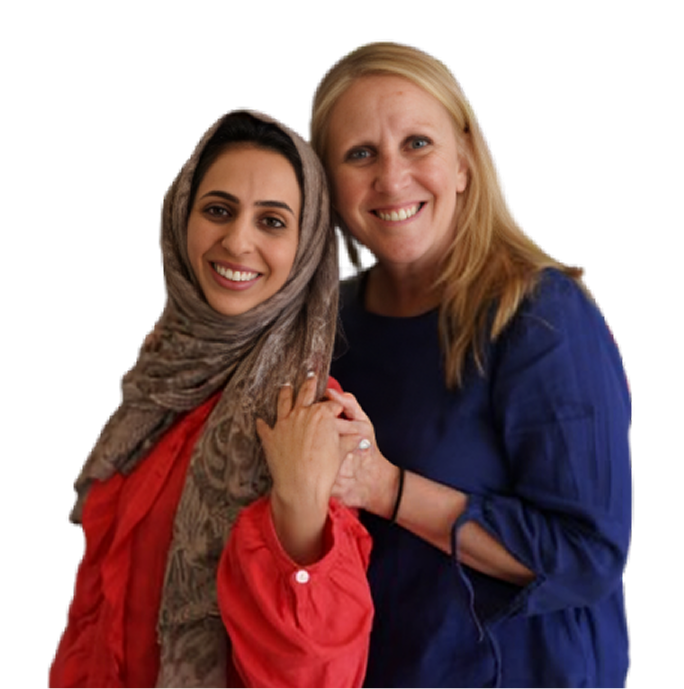Home » Arabic Learning Tips » Why empathy is indispensable for cross-cultural relationships

Click PLAY above to listen to this episode or read the edited transcript below.
This is the last week of Ramadan. I’ve really enjoyed this special month. It has a different feel, even if you’re not Muslim or joining in the rest of the traditions surrounding fasting. In Jordan, we have shorter school days; my kids go to school from 9 to 2, and at most businesses there are shorter workdays as well. It has a chiller pace. You can sleep longer and also come home from work early enough to unwind before attending to other things. If you lean into the experience, it becomes a respite as opposed to other times of the year where city life can be quite overwhelming.
[00:01:31] If you haven’t listened to the last three podcasts, I highly recommend them as a chance to hear in English directly from Arab Muslims about their experience of Ramadan. I often hear non-Arabs voice their perspective as outsiders to the fasting month as to how they believe that Muslims are experiencing their holidays. Unfortunately, their outlook is sometimes negative and can seem quite presumptuous. We need to remember that we are outsiders. We’re unable to actually be folded in to experience those very precious moments that make up the month of Ramadan.
If you’re from the West, think back to how you felt the night before Christmas as you tried to fall asleep but couldn’t. You were too excited, imagining all the presents you would unwrap in the morning. Recall how you felt before heading down to Grandma’s house at Thanksgiving, knowing there would be endless slices of pie. Can you feel something physically in your body when the first Christmas song comes on the radio? All these childhood memories from holiday times are there for our Muslim friends as well. It’s not just about fasting. It’s about all the hours around the clock, the time to read the Qur’an with your family, to wake up before the sun comes up to pray, to share إفطار with those closest to you. These memories and experiences are emotional and precious to our friends.
[00:02:51] I know today that I’m deviating from the strict advice on language learning for Arabic, but for me, the cultural aspect of language learning cannot be divorced from the language itself. Knowing a language should be knowing the majority group that uses the language. While we will always be looking from the outside in, there is something deeply enrapturing and engaging when we can hear from Arab speakers about their culture and religion.
Let me tell you a story from my 20’s that woke me up to this profound way of experiencing people and perhaps changed the whole course of my life. I was living on the island of Sumatra in Indonesia. My husband and I had moved to the middle of the jungle following the tsunami of 2004 to work with a relief and development organization. At the time, as I reflect on my younger, naive self, I possessed a narrow understanding of others and unfortunately, a sense of superiority and certainty when it came to the religion I was raised to follow. As I was learning language, one day I asked my tutor to tell me about the 99 names of God. The people there were known for being religiously devout, but I had been raised to see Islam in a way that wasn’t very positive. Nothing in my childhood could have prepared me for the response that my tutor had when I asked this question.
[00:04:23] As she began to speak of Allah and the “beautiful names of God” (أَسْمَاءُ ٱللَّٰهِ ٱلْحُسْنَىٰ), she increasingly became more passionate and emotional. Soon she was weeping as she told me of the ways that God had met her in expressing God’s self in each of the 99 characteristics.
It was such a powerful encounter.
It floored me. The depth of her encounter with her creator was something to behold. I was in awe as my religious experiences paled in comparison to her experiences of intimacy with God.
Why did I share this story? Because where language and listening intersect, powerful transformation can take place. It’s a huge part of why I do what I do. That day, I was forever changed. I decided to not presume I knew more than someone else about their personal, religious or spiritual experience. I began to listen more and let curiosity lead me to reexamine my own presumptions and experiences. The idea of this episode actually came to me this week when I was reading the book Raising White Kids by Jennifer Harvey. She says, “The only way we show that we actually respect our shared humanity is by taking people’s specific, diverse experiences of their humanity very seriously.” If all of us could live in this way, it would be a profoundly different world.
[00:05:51] Do we respect our shared humanity by taking people’s specific, diverse experiences of their humanity seriously? If so, do we do so in a way that says, I believe you? Your way is valid?
A White male living in the Midwest who had almost no experiences with other cultures, once commented to me that if he was Mexican, he would never try to get into America illegally. I found this certainty absurd and thought for sure he was lacking some information to make such a bold claim. “Don’t you think if your children were living in poverty or you feared their safety, that perhaps you would be desperate enough to try anything?” I asked him. “No,” he firmly replied. “I would never even consider it.”
This idea that we would know or clearly be able to judge what actions we would take if we were born in different circumstances is an epidemic. It can be seen everywhere as people decide that they would never make decisions that would put them in prison or on welfare or be in any kind of need. Quite honestly, this presumption makes us truly horrible world citizens.
Brené Brown says, “What we know matters, but who we are matters more.” Sadly, a lot of people move overseas with good intentions of helping in some way. But if they are lacking the skill of listening with compassion and empathy as well as practicing to reserve judgment, they can be pretty poor representatives of their own culture.
[00:07:31] At our staff meetings, we always start with a personal question. Last week’s question was, “What was a surprising aspect for you of your job?” It broke my heart when one of our employees said it was when she discovered how many people considered her life and her choices wrong, and told her as much.
Some Westerners critique Arab culture as being too heavily influenced by shame and honor. But I wonder sometimes if Westerners often play into this. They reinforce shame messages by telling Arabs, “You don’t do life correctly.” Or, “I feel sorry for you because…” This is something important to be aware of as we interact with other cultures.
Are you bringing shame with you as an outsider who judges?
Brené Brown defines shame as an intensely painful feeling or experience of believing that we are flawed and therefore unworthy of love and belonging. She says this, “fuels disengagement.” And she’s right. Arabs do not want to deepen relationships with people who judge their lives, world or religion, as invalid. Brené says all of the strategies that we have for dealing with shame move us away from connection. The good news is, she says, that the path from shame is through empathy, the real antidote to shame. In her book, she cites a study from the University of Texas that concludes when people share their experiences and their stories with others, their physical health improved and they showed significant decreases in their stress hormones.
Now, that’s something exciting I want to be part of.
[00:09:00] Imagine if your interactions led to that for all of those around you. So next time someone shares with you, perhaps in a language session, about something that you do not see or experience the same way, can you behave in a way that brings life and connection to someone, or will you bring condemnation and judgment? Brené says, “’who we are’ is at least as important as ‘what we want to achieve.’” Who we are matters immeasurably more than what we know or who we want to be. She also says that in an uncertain world, we often feel desperate for absolutes. It’s the human response to fear. And I think that’s sometimes why we behave this way towards others. Often I see the grasping for absolutes that makes us feel safe actually lead to isolation, rejection and disconnection.
I know… I used to be that person.
I hope I’m still changing, still becoming more willing to be vulnerable. I hope I’m not assuming I know how anyone else should feel or live and instead focus on listening, offering, and understanding. In doing so, we become more humble as we continue to be explorers of culture and language. I wish that for all of us this week, as we discover and grow both in language and as human beings.
Move beyond the textbooks. Start your journey toward authentic conversations and real cultural connection with our immersion-led approach.
